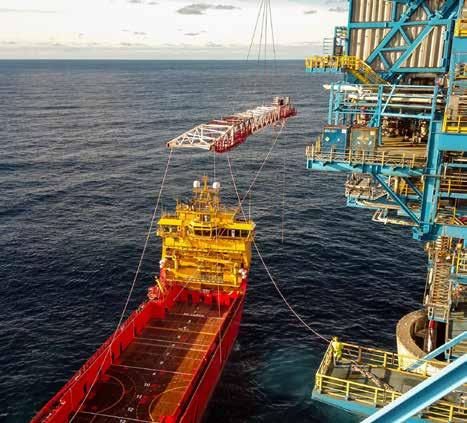OPERATIONS IN THE BLACK SEA Edda Flora, carrying 23 Østensjø crew and 28 DeepOcean crew, manoeuvred into geopolitically controversial waters in the early summer, when tasked with inspecting the newly laid gas pipeline TurkStream in the Black Sea. BY TERJE EMIL JOHANNESSEN
Authorities arrive onboad on arrival
Arriving in Russian waters, captain Ole Kjørlien had to handle a complicated political landscape. In spite of extensive preparations to ensure the shipping company kept abreast of a tangle of regulations, small, almost insignificant deviations led to him being fined.
THE SHIP HAD TO BE IMPORTED
If you are doing work within the 12-mile limit in Russia, they have to «import» the vessel. This rule actually applies in many nations, like Brazil, USA, Mexico and Australia, as a way of protecting domestic jobs. For ships working within these national borders, extensive preparations and delivery of detailed technical documentation on the vessel is necessary. Captain Ole Kjørlien had more than 500 double-paged documents ready for inspection, with every required original signature and official stamp.
DIFFERENT LISTS
- When approaching Russia, we were contacted by two agents who gave us a long list of every formality we had to observe. This new list contained completely new demands to what we needed to provide. We had to act quickly to complete the documentation before being allowed into the port of Novorossijsk. It’s from there that the two pipelines we were inspecting are managed, he says, and continues: - One of the agents representing the Russian oil company that co-owns the pipeline was not available when we arrived. So we were turned over to a different agent, who created a chaotic situation by giving us yet another list of demands, different from the first.
Edda Flora heading for the Black Sea
are,» I replied. He repeated his order to turn starboard, but again I refused before he’d identified himself. Eventually he relented, replying: «Russian Coast Guard.» We made the turn, but I informed him that our ship would then cross a line we had been told not to cross. We then sailed into the port of Anapa, but as we were getting ready to drop anchor, we noticed the waters getting shallower and shallower. During that night, we discovered a message from the Russians that we were not to drop anchor outside the designated are, because they had laid mines. We ended up not dropping anchor, instead I decided to put us on DP, he says. The story continues:
FORCED TO CHANGE COURSE
- The plan was for us to first arrive at a holiday destination, the town of Anapa, while waiting to be allowed into Novorossijsk. The night before arrival, the bridge was a flurry of activity. These waters have a lot of forbidden military zones. We had thoroughly planned our route to the anchorage at 9 o-clock. I started work early that morning and was promptly on the bridge. That’s when we were suddenly radioed with orders to change course. I asked who was giving the order, but the person was hard to understand. He spoke fairly sternly, repeating «turn starboard!» «I’m not going to turn starboard before you tell me who you 20
ØSTENSJØ REDERI
ODOROUS DISINFECTION
A little later, a big tug with 15-20 people on board came up alongside. Two of the crew were dressed in disinfectant equipment and gas masks, carrying a lot of barrels and pumps. They were going to disinfect the entire ship. - Because of Covid, we’d set up a large table in the hangar for our guests, because we didn’t want them going into the crew cabins or among the technical installations. But it was of no use. The disinfectant crew immediately asked for blueprints of the ship, which we gave them. The liquid smelled awful, he says, making a grimace to state his point.



















